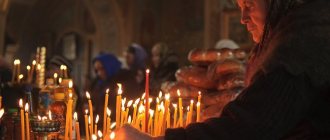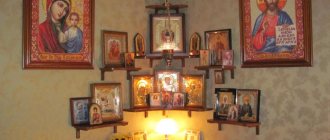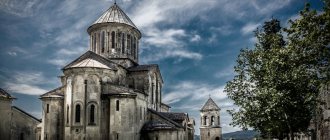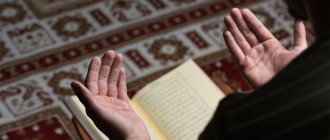Christian rituals have a rather long history. People perform them mechanically, without thinking about why they are needed. Previously, when someone died in the family, the relatives knew the entire procedure. The deceased was washed, prepared for burial, and his arms were folded on his chest. The coffin stood in the middle of the room. A lamp was burning in the corner, and the mirrors were hung with black material. They put a cover on the street, so the neighbors knew they needed to come in and say goodbye. The whole village accompanied the deceased on his last journey. Fir branches were scattered behind the procession. Now relatives do not need to engage in these activities. The funeral agency takes care of all the preparation. Employees will conduct funeral services and prepare everything necessary for farewell. As a result, many rituals became a thing of the past. Mirrors are no longer covered, spruce branches are no longer laid out. But there are Christian elements that must be present. For example, you need to put an icon in the coffin. After all, this is a symbol of faith that is necessary for the funeral service. But what to do with it next? Many people believe that such an item should not be taken home.
How to choose an Orthodox icon for a funeral
It is traditional for men to place an icon of Jesus Christ or St. Nicholas the Wonderworker in their coffins. Icons of the Mother of God are placed in the coffin of women. All other details associated with this ritual will be the same for men and women, for adults and for children.
Any person can place an icon with the saint whose name the deceased bore in the coffin. Less often, an icon of a saint whom a person revered more than others during his lifetime is used for farewell. It is believed that the patron saint, who is depicted on the icon, will protect the soul of the deceased in the afterlife ordeals.
The cost of the burial icon does not matter. This item has a spiritual meaning; the price of the icon does not matter. To express love and respect for the deceased, you can buy an expensive icon for burial. You can also use regular ones from the church shop, including paper ones.
Prayer for the repose of the soul of every deceased Christian
Prayer for deceased parents
Lord Jesus Christ our God! You are the keeper of the orphans, the refuge of the grieving and the comforter of the weeping. I come running to You, orphaned, groaning, and... crying, and I pray to You: hear my prayer and do not turn Your face away from the sighs of my heart and from the tears of my eyes.
I pray to You, merciful Lord, satisfy my grief over separation from the one who gave birth and raised me, my parent (name); accept his soul, as if it had gone to You with true faith in You and firm hope in Your love for mankind and mercy, into Your Heavenly Kingdom.
I bow before Your holy will, which was taken away from me, and I ask You not to take away Your mercy and mercy from him. We know, Lord, that You, the Judge of this world, punish the sins and wickedness of the fathers in children, grandchildren and great-grandchildren, even to the third and fourth generation: but you also have mercy on the fathers for the prayers and virtues of their children, grandchildren and great-grandchildren.
With contrition and tenderness of heart, I pray to You, merciful Judge, do not punish with eternal punishment your deceased servant, unforgettable for me, my parent (name), but forgive him all his sins, voluntary and involuntary, in word and deed, knowledge and ignorance, committed by him in life him here on earth, and according to Your mercy and love for mankind, prayers for the sake of the Most Pure Mother of God and all the saints, have mercy on him and deliver him from eternal torment.
You, merciful Father of fathers and children! grant me, all the days of my life, until my last breath, not to cease to remember my deceased parent in my prayers, and to beg You, the righteous Judge, to order him in a place of light, in a cool place and in a place of peace, with all the saints , from here all illness, sorrow and sighing have escaped. Merciful Lord!
Receive this day for Thy servant (name), my warm prayer and give him Thy reward for the labors and cares of my upbringing in faith and Christian piety, as He who taught me first of all to lead You, My Lord, to pray in reverence to You, in You alone to trust in troubles, sorrows and illnesses and keep Your commandments;
For his concern for my spiritual success, for the warmth of his prayers for me before You and for all the gifts he asked me from You, reward him with Your mercy, Your heavenly blessings and joys in Your eternal kingdom.
For You are the God of mercies and generosity and love for mankind, You are the peace and joy of Your faithful servants, and we send glory to You with the Father and the Holy Spirit, now and ever and unto the ages of ages. Amen.
Prayer for one who died up to 40 days
Read from the day of death 40 days and before the anniversary 40 days before the day of death daily.
Remember, O Lord our God, in the faith and hope of the eternal life of Your departed * servant, our brother (name), and as Good and Lover of mankind, forgiving sins and consuming untruths, weaken, forsake and forgive all his voluntary and involuntary sins, deliver him eternal torment and fire of Gehenna, and grant him the communion and enjoyment of Your eternal good things, prepared for those who love You: even if you sin, do not depart from You, and undoubtedly in the Father and the Son and the Holy Spirit, Your glorified God in the Trinity, Faith, and Unity in the Trinity and the Trinity in Unity is Orthodox even until its last breath of confession. Be merciful to him, and the faith that is in You, instead of deeds, and rest with Your saints, as you are Generous: for there is no man who will live and not sin, but You are the only One besides all sin, and Your truth is righteousness forever, and You are the One God of mercy and generosity, and love for mankind, and to You we send glory, to the Father and the Son and the Holy Spirit, now and ever and unto ages of ages. Amen.
Prayer for the repose of the soul of the deceased for 9 days
God of spirits and all flesh, having trampled down death and abolished the devil, and given life to Thy world! Himself, Lord, give rest to the souls of your departed servants: your most holy patriarchs, your eminence metropolitans, archbishops and bishops, who served you in the priestly, ecclesiastical and monastic ranks; the creators of this holy temple, the Orthodox forefathers, fathers, brothers and sisters, lying here and everywhere; leaders and warriors who laid down their lives for the faith and fatherland, the faithful, who were killed in internecine warfare, drowned, burned, frozen to death, torn to pieces by beasts, who suddenly died without repentance and did not have time to reconcile with the Church and with their enemies; in the frenzy of the mind of those who committed suicide, those for whom we were commanded and asked to pray, for whom there is no one to pray and the faithful, Christian burial deprived of (name) in a bright place, in a green place, in a place of peace, from where sickness, sadness and sighing escaped. Every sin committed by them in word or deed or thought, as a good Lover of mankind, God forgives, as if there is no man who will live and not sin. For You are the only one besides sin, Your righteousness is truth forever, and Your word is truth.
For You are the Resurrection, and the Life and Repose of the departed Thy servant (name), Christ our God, and to You we send glory with Your beginningless Father, and Your Most Holy, and Good, and Life-giving Spirit, now and ever and unto the ages of ages. Amen.
Prayer for the newly deceased
Remember, O Lord our God, in faith and hope the life of Thy eternal newly departed servant (or Thy servant), (name), and as a good and loving man, forgiving sins and consuming untruths, weaken, forsake and forgive all his voluntary and involuntary sins, exonerating him at Thy holy second coming into the communion of Thy eternal blessings, for the sake of which in Thee is the only faith, the true God and Lover of mankind. For Thou art the resurrection and life and rest of Thy servant, (name), Christ our God. And we send glory to You, with Your beginningless Father and with the Most Holy Spirit, now and ever and unto ages of ages, Amen.
A short prayer for the departed
Rest, O Lord, the souls of Your departed servants: my parents, relatives, benefactors (their names), and all Orthodox Christians, and forgive them all sins, voluntary and involuntary, and grant them the Kingdom of Heaven.
Should I leave the icon in the coffin or take it?
When asked what to do with the icon after burial, the church does not give an exact answer. This is decided by the relatives of the deceased. You can consult about this with a priest you trust.
- You can leave the icon in the coffin and bury the deceased with it.
- You can take out the icon and leave it in the church for 40 days while funeral prayers are read (Sorokoust). Afterwards, the icon can be taken away to be placed on the home iconostasis.
- You can immediately donate the icon to the church and not pick it up after 40 days.
If you take the icon home, you should use it to commemorate the deceased. You can light candles and read prayers in front of the funeral icon. It is recommended to do this on the day of death and on the birthday of the deceased, on special memorial days established by the church. A consecrated icon from the coffin cannot harm living people: this is a widespread superstition.
But if the presence of a funeral icon in the house brings gloomy thoughts to you, you are not obliged to keep it. At any time you can donate an icon to the church to let go of the past. This act is not considered a sin or disrespect for the memory of the deceased.
But you must not throw the icon in the trash, burn it, or damage it in any other way. Even if you don’t believe in God, take a little time and bring the icon to the nearest church.
How to remember correctly after death?
After the 40-day period, deceased loved ones are remembered several times a year:
- on the anniversary of death
- on Radonitsa (Tuesday of the second week after Easter)
- on parental Saturdays (the Saturday before Maslenitsa (meat day); the second, third and fourth Saturdays of Great Lent; the Saturday before the Feast of Pentecost)
Demetrius Saturday (the Saturday before November 8 - the day of remembrance of the Great Martyr Demetrius of Thessaloniki) and May 9 are intended to commemorate the fallen soldiers.
These days you need to order a commemoration at the Liturgy, a memorial service, visit the grave of a loved one and read the litiya.
How to properly remember the deceased on the anniversary of death?
On the anniversary of death it is necessary
- write a custom note for commemoration at the Liturgy,
- order a memorial service and
- read the litiya at the cemetery.
It is also customary to host a memorial meal for family and close friends.
Is it possible to put other things in the coffin besides the icon?
The Orthodox Church disapproves of this tradition. The custom of putting things in the coffin that may be useful to the deceased in the afterlife is originally pagan. This tradition existed in many pre-Christian cultures. Together with the dead people, their wives, servants, horses, weapons and other useful items were buried.
In the Orthodox tradition, the well-being of the soul does not depend on the objects that are placed in the coffin, but on the deeds of the deceased during his lifetime and the strength of the prayers of his relatives. Placing too many things in a coffin is not blessed, but one exception can be made. For example, putting his pipe in a smoker’s coffin, or a child’s favorite toy.
It is worth understanding that this gesture is important for the relatives of the deceased, and not for him. After death, material things have no meaning. They will not be needed after the promised resurrection.
Reading rules
Any child can save the souls of his father and mother. The church plays a major role in this. To do this, order eternal obedience, magpie and never-ending prayer service. During each service, church ministers pray for the soul of a deceased person, asking God to have mercy on him.
The main prayers are read at the Divine Liturgy. If a daughter or son wants their parents to be remembered there, they can write the necessary names in the genitive case on a piece of paper. Submit the note to the church minister, who will draw an eight-pointed cross on top. But such a step does not free petitioners from their own prayer. It is recommended to say it in the morning, after sunrise.
Divine funeral liturgy in the temple
To do this, visit the church. But if there is an image of a savior at home, then everything can be done in a warmer environment. A cup of salt is placed in front of the icon, a candle is stuck into it, and bread is placed next to it and a glass of water is placed. The petitioner stands in front of the image and reads the sacred words without despondency or other sorrowful feelings. They burden the person praying and the deceased whom he remembers. His soul will rush around and forget about his own peace.
After reading the prayer, a sacrifice is made. It could be a candle, money, candy, wine, etc. When leaving the church, you need to give alms to those in need. Let them also remember the departed.
The monument at the grave of parents should be a sacred place. Children are required to keep the area clean and tidy. If you wish, you are allowed to read prayers in the cemetery. To do this, you need to have a church candle with you. But that's all there is to do there. Any drinking or eating food is prohibited. By such actions, visitors show disrespect for the memory of the deceased person.
Drinking and eating are prohibited in the cemetery
When should you not put an icon in a coffin?
The Orthodox icon in the coffin is not needed for the formal fulfillment of tradition. According to the canons, the saint depicted on it helps the soul in its wanderings in the afterlife. Therefore, icons are not placed on people who, according to tradition, do not have the right to funeral services and to the help of saints:
- Unbaptized people.
- To suicides.
- Baptized people who renounced the faith and were hostile to the church.
- Representatives of another faith or another movement in Christianity.
The modern church allows only one exception to this rule. Suicides who committed suicide due to mental illness (depression, schizophrenia) are allowed to be buried according to the canons. It is believed that these people did not realize what they were doing and deserve leniency and intercession.
The fate of suicides
Church ministers refuse to perform funeral services for those who committed suicide. Even during the Last Judgment such sinners are taken aside. But one day a year the church prays for them, saying a special prayer:
Suicides are buried without funeral services
The Orthodox faith calls for alleviating the torment of souls, regardless of their sudden death or predestined death in human life.
Buy an Orthodox burial set
There are Orthodox farewell sets according to the canons of tradition. By purchasing such a set, you will definitely not break the existing rules. You won't have to select attributes for goodbye, and you will be able to devote more time to other things.
What is included in the standard Orthodox set:
- pectoral cross;
- cross in hand;
- icon in the coffin;
- church candles;
- a whisk on the forehead.
You can buy a church burial set through our funeral agency. We are ready to help you negotiate with the church to organize a memorial service. The funeral service for the deceased can be held in person or in absentia. After the funeral, a funeral prayer should be ordered within 40 days (Sorokoust).
The loss of a loved one is a difficult moment that is difficult to cope with. Not many people can find enough strength to study church rituals and the nuances of organizing a funeral at this time. We will help you see off a loved one on their final journey with dignity, observing all the canons of the Orthodox faith. Our consultants are ready to explain in detail any details related to ritual rites, with respect for your grief.
Why are religious attributes placed next to the deceased?
Religious attributes placed in the coffin have a special purpose. Firstly, it denotes a person’s belonging to a particular faith. Secondly, it indicates that the person was baptized during his lifetime. Thirdly, it determines how ready a person is for the funeral service. If there is only a cross, but no other attributes - a corolla, prayer (Orthodoxy) or a ladder (Old Believers) - then the deceased was baptized, but did not lead such a righteous life as to be allowed to attend the funeral service.
Funeral arrangements










